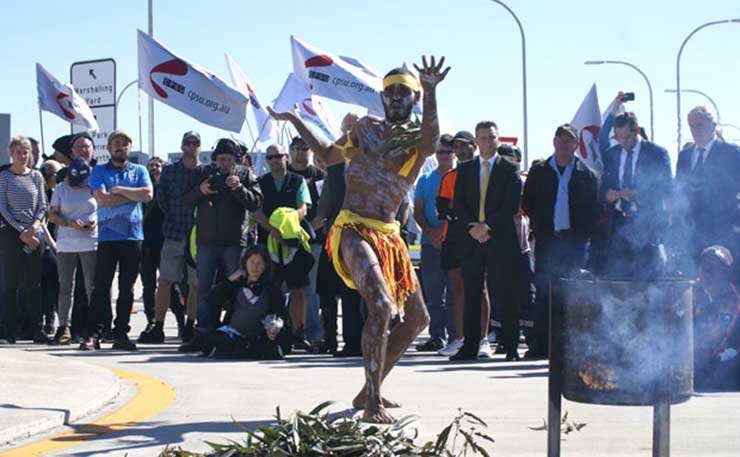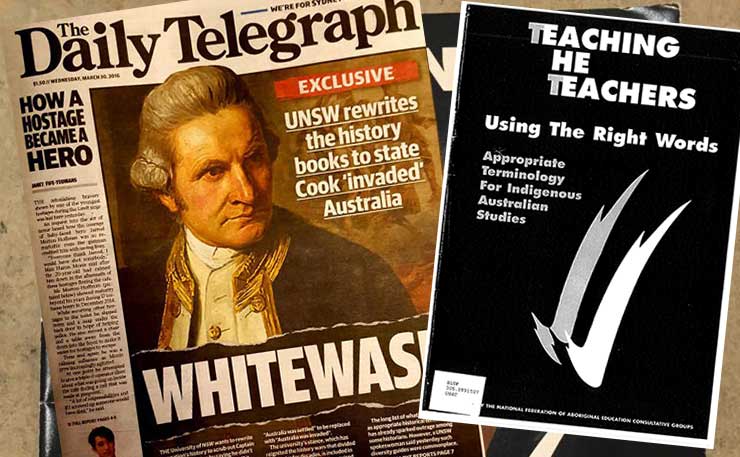In Waleed Aly’s Fairfax column last week he explained the “anatomy” of our national neurosis, the one that periodically erupts whenever white men are challenged about their natural order.
The order they have been appointed to the very apex of by, variously, God, their kleptocrat mates or miscellaneous undisclosed donors. Out they trotted last week to bewail the advise in a UNSW handbook that we acknowledge over 300 Aboriginal homelands were invaded when New Holland was ‘occupied and colonised’.
Resident sciolist Alan Jones and the predictable media-mafia added yet again to the great store of andropausal tephra ejected into our lives, out of the bottomholes of mostly-men.
And we all dutifully face-palmed and shared acerbic memes (this one was my fav).
Meanwhile here at New Matilda some actual journalism uncovered that this guide on ‘Indigenous terminology’ was first circulated by UNSW over two decades ago, while the Rip Van Winkles over at the Daily Tele were snorgasming through the wet dream of uninterrupted white male privilege, or, I should say, bonne chance.
Aly – also identifiably an actual journalist, not to mention a public salve to Australians who don’t agree that white men get to lock up brown children and bleach our reef without penalty while paying no taxes – rolled out a coin wrapper of his two cents.
He likens our collective “weirdness” about our founding act of dispossession to American hysteria about gun ownership. They’re both symptomatic of unresolved impasses in national memories. For us it is the denial of dispossession we remain “strangely insecure about”.
His comparison with the US doesn’t end there, but it takes a perplexing turn. Aly claims American acceptance of its history of slavery is descriptive of its willingness to face its past, warts and all – unlike us.
His explanation? That the American ethos is one of self-improvement, which depends on ongoing introspection, while ours is one of defensive denial of our historical scars, leaving them to fester as ‘fatal psychological wounds’.
We are a festering nation. Aly is absolutely right. But our incapacity to face our colonial past is in fact shared by the US. It’s defining of the structure of settler-colonies which both nations have as their origin.

Aly glosses over the dispossession of Native-Americans, arguing US attention has been diverted by the ‘tonnage’ of history devoted to slavery – as though Americans’ readiness to acknowledge the tragedy of slavery somehow covers the dispossession of native Americans too.
Slavery is a distinct form of racism to dispossession. As Patrick Wolfe has made so clear, colonial invasion is less about race than it is about land. It also, he argued, inheres an identifiable logic: Elimination of the native.
The dispossession of First Nation peoples is the founding act of settler-colonies and one that can never be resolved. It might be compensated, its ongoing impacts mitigated, its legal premise of terra nullius overturned. It might be ‘recognised’ with a preamble in the constitution. It might even be genuinely regretted with national apologies. But it can never be undone and can only be rectified by a treaty that credits sovereignty.
Arguably the manifold legacies of slavery can’t be expunged either – the struggle of the Black Lives Matter movement is but one reminder. And while the racial polarities ensuing from slavery remain no less heinous and crippling, they are nevertheless remembered quite differently.
As we know too well – with the overturning of the Yorta Yorta native title claim by Justice Olney, on the grounds that the ‘tide of history’ had washed away their continuous occupation – how we remember is critical to restoring justice to Aboriginal Australians.
As a number of historians have argued, it is part of the structure of settler-colonialism to repress any memory of invasion. This endemic amnesia also informs our inability to see the dispossession of the Palestinians for what it is, as it advances under our noses towards their ultimate elimination. As long as we remain blind to the workings of settler-colonialism here, we’ll fail to identify it elsewhere.
Slavery and dispossession are both racial constructs of expropriation but they are nevertheless distinct racial regimes. They are differently remembered, even by Aly, and this is an expression of that historical difference. As Wolfe explains, ‘black Americans were primarily colonised for their labour rather than for their land’.

Thus Indigenous peoples have been targeted for assimilation through the removal of their children with the aim of their biological absorption – ‘breeding out the colour’ and ultimate elimination (giving rise to the myth of dying race).
African slaves, on the other hand, were vigorously excluded from comingling blood with whites – the ‘one drop rule’ (giving rise to the myth of African sexual hyperpotency and lynchmob hysteria).
Sickening racism both. Unimaginable histories with ongoing violence, discrimination and disadvantage both. This is not an argument for which was worse by any means.
But this critical distinction between historical forms of racism shapes both Australia’s and the US’ incapacity to integrate the dispossession of their First Nation peoples into their national remembering.
If we want to understand the settlerphobias of white men like Jones and why they are so spooked by references to invasion we have to inculpate slavery and dispossession for their different crimes rather than imagine one can stand in for the other.
When it comes to forgetting our respective invasions Australia and the US are all too alike. When it comes to slavery Americans ceased enslaving – though they’ve morphed this racism to disproportionately incarcerating, exploiting and gunning down black lives.
With Queensland Labor’s approval of Adani’s Carmichael mine over Wangan and Jagalingou lands we own up to the real reason settlers baulk at remembering invasion. We’re still doing it.
*Author’s note, Patrick Wolfe sadly died last month, just as his most recent book, Traces of History: Elementary Structures of Race came out. It’s a must read for those of us committed to working strategically towards the elimination of different forms of racism and the ongoing imaginings that they depend on.
Donate To New Matilda
New Matilda is a small, independent media outlet. We survive through reader contributions, and never losing a lawsuit. If you got something from this article, giving something back helps us to continue speaking truth to power. Every little bit counts.






